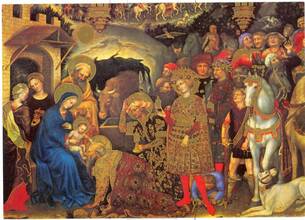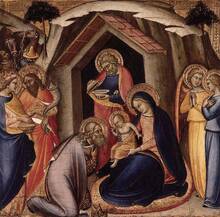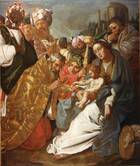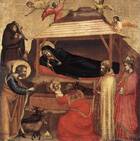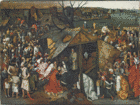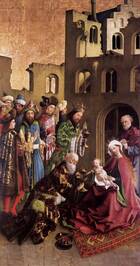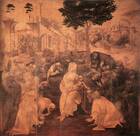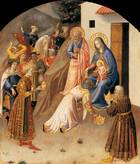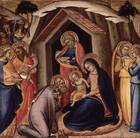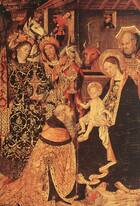The Epiphany
Solemnity - 6 January
Some countries have moved this feast to the nearest Sunday
Pope Francis' words in: 2017, Jubilee of Mercy 2016, 2015 & 2014
Papa Benedict XVI's words in: Year of Faith 2013, 2012, 2011, 2010, 2009, 2008, 2007 & 2006.
St John Paul II's words in: 2005, 2004, 2003, 2002, 2001 (end of Jubilee Year), Great Jubilee 2000, 1999, 1998, 1997 & 1979.
St Paul VI's words in Bethlehem in 1964 (during the 1st papal trip abroad in over a century)
St John Paul II's homily in 2001 ![]()
"The Magi tell us above all that, when we encounter Christ, we must learn to stop and live profoundly the joy of intimacy with Him."
Papa Benedict XVI's homily in 2006 ![]()
"The Magi worshipped a simple Child in the arms of his Mother Mary, because in Him they recognized the source of the double light that had guided them: the light of the star and the light of the Scriptures. They recognized in Him the King of the Jews, the glory of Israel, but also the King of all the peoples."
Pope Francis's homily in 2014 ![]()
"On the feast of the Epiphany, when we recall the manifestation of Jesus to humanity in the face of a Child, may we sense the Magi close by our side, as wise companions on the road. Their example helps us to lift our gaze to the star and to follow the great desires of our hearts. They teach us not to content ourselves with a mediocre life, with “coasting it, playing it safe”, but to let ourselves always be fascinated by what is good, true and beautiful… by God, who is all of this, in an always greater way! And they teach us not to let ourselves be deceived by appearances, by that which for the world is great, wise, powerful. We must not stop there. It is necessary to keep the faith. In these times this is so important: to keep the faith. We must go further, beyond the darkness, beyond the fascination of the Sirens, beyond worldliness, beyond so many forms of modernity that exist today, to go to Bethlehem, there where, in the simplicity of a house on the periphery, between a mummy and daddy full of love and faith, shines forth the Sun come from on high, the King of the universe. Following the example of the Magi, may we, with our little lights, seek the Light and keep the faith. So be it."
3 2us by Father Javier Igea ![]()
"The best gift that we can give is the gift of ourselves. The best gift is not a material thing but it is our heart and It is what we truly celebrate in the Feast of the Epiphany: God has given himself to us, God has given our heart to us in the Incarnate Word, the baby Jesus, which is given to humanity. The invisible God has made himself visible in the flesh of Christ."
Evangelium by Father Marcus Holden ![]()
"What the Wise Men did as the first Gentiles did meeting the Lord, we too do every time we come into His real presence in the Eucharist in the Mass. It is as if that moment of the Epiphany, when the Wise Men bowed down and worshipped Him, is caught in time, or rather we join in with them as they are shown the Christ and adore Him."
To download the free mp3 audio recordings individually, right/double click on the play buttons ![]()
Catechesis by Pope St John Paul II on the Epiphany
General Audience, Wednesday 24 January 1979 - in English, French, Italian, Portuguese & Spanish
"1. On the feast of the Epiphany we read the passage from the Gospel of St Matthew which describes the arrival of some Magi from the East at Bethlehem: "Going into the house they saw the child with Mary his mother, and they fell down and worshipped him. Then, opening their treasures, they offered him gifts, gold and frankincense and myrrh." (Mt 2:11-12).
We have already spoken once here, of the shepherds who found the baby, the born Son of God, lying in a manger (Lk 2:16).
Today we return once more to those characters who, according to tradition, were three in number: the Magi Kings. St Matthew's concise text renders very well what is part of the very substance of man's meeting with God: "they fell down and worshipped him". Man meets God in the act of veneration, of worship, of cult. It is useful to note that the word "cult" (cultus) is closely related to the term "culture". Admiration, veneration for what is divine, for what raises man on high, belongs to the very substance of human culture, of the various cultures. A second element of man's meeting with God, highlighted by the Gospel, is contained in the words: "opening their treasures, they offered him gifts ... ". In these words, St Matthew indicates a factor that deeply characterizes the very substance of religion, understood both as knowledge and meeting. A merely abstract concept of God does not constitute, does not yet form this substance.
Man gets to know God by meeting him, and vice versa he meets him in the act of getting to know him. He meets God when he opens up to him with the interior gift of his human "ego", to accept God's Gift and reciprocate it.
The Magi Kings, at the moment when they present themselves before the Child in his mother's arms, accept in the light of the Epiphany the Gift of God Incarnate, his ineffable dedication to man in the mystery of the Incarnation. At the same time, "opening their treasures, they offered him gifts"; it is a question of the concrete gifts of which the evangelist speaks, but above all they open themselves up to him, with the interior gift of their own heart. And this is the real treasure they offer, of which the gold, incense and myrrh are only an exterior expression. The fruit of the Epiphany consists in this gift: they recognize God and they meet him.
2, When I meditate in this way, together with you gathered here, on those words of the Gospel of Matthew, there come into my mind the texts of the Constitution Lumen Gentium which speak of the universality of the Church. The day of the Epiphany is the feast of the universality of the Church, of her universal mission. Well, we read in the Council: "The one People of God is accordingly present in all the nations of the earth, since its citizens, who are taken from all nations, are of a kingdom whose nature is not earthly but heavenly. All the faithful scattered throughout the world are in communion with each other in the Holy Spirit so that 'he who dwells in Rome knows those in most distant parts to be his members' (n. 9). Since the kingdom of Christ is not of this world (cf. Jn 18:36), the Church or People of God which establishes this Kingdom does not take away anything from the temporal welfare of any people. Rather, she fosters and takes to herself, in so far as they are good, the abilities, the resources and customs of peoples. In so taking them to herself she purifies, strengthens and elevates them. The Church indeed is mindful that she must work with that king to whom the nations were given for an inheritance (cf. Ps 2:8) and to whose city gifts are brought (cf.. Ps 71 [72] :10; Is 60:4-7; Rev 21:24). This character of universality which adorns the People of God is a gift from the Lord himself whereby the Catholic ceaselessly and efficaciously seeks for the return of all humanity and all its goods under Christ the Head in the unity of his Spirit. "In virtue of this catholicity each part contributes its own gifts to other parts and to the whole Church, so that the whole and each of the parts are strengthened by the common sharing of all things and by the common effort to fullness in unity. Hence it is that the People of God is... an assembly of various peoples ... " (Lumen Gentium, 13).
Here we have before our eyes the same image present in the Gospel of St Matthew read at Epiphany; only it is far more developed. The same Christ who in Bethlehem, as a Child, accepted the gifts of the Magi Kings, is still the One to whom men and whole Peoples "open their treasures". The gifts of the human spirit, in the act of this opening before God Incarnate, take on a special value, become the treasures of various cultures, the spiritual riches of Peoples and Nations, the common heritage of the whole of mankind. This heritage is formed and grows continually through that "exchange of gifts", of which the constitution Lumen Gentium speaks. He is the centre of that exchange; the same one who accepted the gifts of the Magi Kings. He himself, who is the visible and incarnate Gift, causes the opening of souls and that exchange of gifts from which live not only individuals, but also peoples, nations, and the whole of mankind.
3. The whole preceding meditation is to some extent an introduction and preface to what I want to say now.
Tomorrow I am to undertake, with the grace of God, a journey to Mexico, the first of my pontificate. I wish here to follow the great Pope Paul and continue the tradition he began. I am going to Mexico, to Puebla, on the occasion of the Episcopal Conference of Latin America, which is beginning its work on Saturday next with the eucharistic concelebration in the Sanctuary of Our Lady of Guadalupe. Today, already, I express my gratitude, both to the representatives of the Episcopate for the invitation addressed to me, and to the representatives of the Mexican Authorities, particularly the President of that Republic for his favourable attitude to this journey, which makes it possible for me to carry out such an important pastoral duty.
I am referring at this moment to the liturgy of the feast of the Epiphany as well as to the words of the Constitution Lumen Gentium, which enable all of us to cast a glance at those particular gifts which the people and the Church that is in Mexico have contributed and continue to contribute to the common treasure of mankind and of the Church.
Who has not at least heard of the splendours of ancient Mexico? Of its art, its knowledge in the field of astronomy, its pyramids and its temples, in which its aspiration to the divine, though imperfect and still non-illuminated, was expressed?
And what are we to say of the cathedrals and churches, the palaces and city councils, built in Mexico and by Mexican artisans after its Christianization? These buildings are an eloquent expression of the marvellous symbiosis that the Mexican people has been able to operate between the best elements of its past and those of its Christian future which it was then entering.
But Mexico has made great progress also in the most recent period. Alongside the famous constructions in the so-called colonial style, today there are the skyscrapers, large streets, impressive public buildings, and industrial plants of modern Mexico. But—and here is another of its merits—in the midst of the modern political, technical, and civil progress, the Mexican soul shows clearly that it wishes to be and to remain Christian: even in his typical popular music, the Mexican sings also of his eternal nostalgia for God and his devotion to the Blessed Virgin. And in difficult times of the past, now fortunately over, the Mexican showed not only good religious sentiments but remarkable and in fact, sometimes, heroic fortitude and staunchness of faith, as many people will still remember.
I am convinced that, in the presence of Christ and his Mother, it will be possible to realize again that "opening and exchange of gifts" to which the Episcopate of Latin America, I myself, and the whole Church, attach such great hopes for the future.
4. Let us return once more to St Matthew's description. The Gospel says that that "opening of gifts" of the Magi Kings in Bethlehem was realized in the presence of the Child and his Mother.
Let us add that this situation continues to be repeated in just this way. Does not the history of Mexico and the history of the Church in that land, prove it? Going there, I rejoice particularly in the fact that I will find myself in the footsteps of so many pilgrims, who go from the whole of America, especially Latin America, to the Sanctuary of the Mother of God at Guadalupe.
I myself come from a land and a nation whose heart beats in the great Marian sanctuaries, especially in the sanctuary of Jasna Gora, I would like to repeat once more, as on the day of the inauguration of the pontificate, the words of the greatest Polish poet: "Holy Virgin, who defend bright Czestochowa, and shine forth in the Pointed Gate ... "
This enables me to understand the people, the peoples, the Church, the continent, whose heart beats in the Sanctuary of the Mother of God at Guadalupe.
I hope too that this will open the way for me to the heart of that Church."
Ai malati
"Desidero rivolgere un saluto particolare ai malati qui presenti. Soprattutto voglio assicurarli che il Papa non li dimentica, anzi riserva sempre loro un posto speciale nel suo cuore e nelle sue preghiere. Coraggio!
Nello stesso tempo, intendo anche formulare un cordiale auspicio di piena riuscita della Giornata Mondiale dei Lebbrosi, che si terrà anche qui a Roma il 28 gennaio prossimo, con alcune iniziative culminanti nella Celebrazione Eucaristica presieduta dal Cardinale Vicario della Basilica di San Giovanni in Laterano. Il Signore sostenga e fecondi il lavoro umile ma splendido di coloro che si dedicano a sconfiggere questo male tremendo, come le Suore del Terz’Ordine di San Francesco di Syracuse (USA), alcune delle quali sono qui presenti. Anche in questo impegno tutti possiamo dimostrarci discepoli del nostro Maestro e Signore Gesù, che davanti ai lebbrosi adottò atteggiamenti di umiltà, non limitati alla compassione, ma consistenti in concreti e prodigiosi interventi di salvezza (cf. Mc 1,40-41). Che questi voti siano fecondati dall’assistenza divina, e a tutti sia di conforto la mia paterna Benedizione Apostolica."
A vari gruppi
"Saluto ora, con viva cordialità e con paterna affezione il Pellegrinaggio delle diocesi di Civita Castellana, Orte e Gallese e delle diocesi di Nepi e Sutri, guidato dal proprio Vescovo.Carissimi, nell’esprimervi l’apprezzamento e la soddisfazione del mio animo, vi ringrazio per questa significativa e gradita visita, che ricambio con fervidi voti. Auspico che tutti voi qui presenti insieme con quanti rappresentate, siate sempre “forti nella fede” (1Pt 1,5), “esultanti nella speranza” (Rm 12,12), assertori di verità e di carità (cf. Ef 4,15), perché possiate offrire in ogni tempo e in ogni luogo una testimonianza sincera, luminosa e convincente di vita ispirata alla persona, alla dottrina e all’esempio di Cristo Gesù (cf. At 1,8). Avvaloro tale auspicio con la propiziatrice Benedizione Apostolica, estensibile a tutte le vostre famiglie e alle persone care.
Aggiungo poi un saluto per i pellegrinaggi parrocchiali, fra i quali oggi sono particolarmente numerosi quelli di alcune Parrocchie Romane: quella dei Santi Pietro e Paolo all’EUR, del Santissimo Nome di Maria al Quartiere Appio-Latino e quella di San Tommaso Moro a via Tiburtina. Assicuro a tutti il mio costante ricordo nella preghiera e di cuore tutti benedico."
Agli sposi novelli
"Anche oggi sono presenti varie coppie di sposi novelli. Porgo loro i miei auguri e desidero assicurarli di una mia particolare preghiera, affinché, nella nuova vita che iniziano insieme, il Signore li assista e li benedica."

